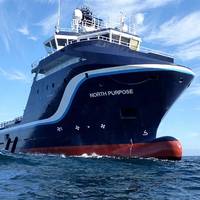Cautious Consolidation for OSV Companies Brings Market Change

Will a rising tide in the offshore oil markets float all the boats? In the U.S. Gulf of Mexico, that remains to be seen.Offshore services, exploration and production are on a roll. In early October, yet another business combination of big drillers was announced. In a sign of optimism, Ensco announced its plan for an all-stock acquisition of Rowan Offshore, worth around $2.4 billion. The new company will be domiciled in the United Kingdom, but will have a large presence in Houston.
South Korea Implements CSI
The U.S. Bureau of Customs and Border Protection issued a Press Release
AAPA Study Examines Cruise Ports
To accommodate rapid growth in the North American passenger cruise industry, U.S. ports are facing potential expenditures of $150-300 million to meet existing Federal regulations for cruise facility design and space. That’s the conclusion of a study launched this year by the American Association of Port Authorities (AAPA), with the results unveiled at AAPA’s annual convention in Curaçao. AAPA initiated the study to address cruise ports’ pressing concerns over elaborate, cumbersome, costly and duplicative Federal requirements. The association retained the services of Bermello, Ajamil & Partners, experts in facility design. to conduct the study and recommend solutions.
Electronic Advance Manifest Information
The U.S. Bureau of Customs and Border Protection issued a Press Release stating that it will soon be promulgating its rules on presentation by carriers of electronic advance manifest information. The requirement will be similar to the current requirement that ocean carriers submit manifest information at least 24 hours prior to loading in a foreign port. The differences are that the new rules will require that all advance manifests be submitted electronically and the requirement will apply to all modes and for cargoes being imported or exported. For cargoes being exported by ship, the electronic manifest information will have to be submitted at least 24 hours prior to departure from the U.S. port where the cargo is laden. The requirement is to be phased in over the coming months.
South Africa implements CSI
The U.S. Bureau of Customs and Border Protection issued a Press Release stating that the Container Security Initiative (CSI) has become operational in the port of Durban, South Africa. Durban becomes the 17th CSI port worldwide and the first in Africa. Source: HK Law
CBP Delays Enforcement of Change to “Shipper” Element
The U.S. Bureau of Customs and Border Protection (CBP) issued a Notice stating that is delaying indefinitely implementation of the change to the “shipper” element of the advance manifest filing requirement as provided for in its December 5, 2003 rulemaking under the Trade Act of 2002. The change was scheduled to come into effect on March 4, 2004 and would have changed the “shipper” element of the advance manifest filing required of carriers from “the shipper’s complete name and address, or identification number, from all bills of lading” (as provided for in the October 31, 2002 rulemaking establishing the 24-Hour Rule) to “the identity of the foreign vendor, supplier, manufacturer, or other similar party” (as provided for in the December 5, 2003 rulemaking).
Advance Cargo Manifest: Delay for Bulkers
The U.S. Bureau of Customs and Border Protection (CBP) issued a revised set of Frequently Asked Questions (FAQ) relating to the requirement for carriers bringing cargo by ship to the United States to present in advance an electronic copy of the manifest. The new FAQ includes a discussion (on pages numbered 1 and 2) of the enforcement date. Previously, the enforcement date was March 4 (today). That is unchanged, except for bulk carriers, break bulk carriers, and passenger vessels. For this latter group, CBP is allowing a period of informed compliance for 30 days. On April 2, 2004, CBP will commence enforcement actions with regard to such carriers that fail to comply with the required advance electronic presentation of cargo information rule that was promulgated on December 5, 2003.
Electronic Transmission of Manifests
The U.S. Bureau of Customs and Border Protection (CBP) issued a rule amending the regulation pertaining to filing of commercial vessel manifests for passengers and crew members. Effective June 6, such manifests must be filed electronically (submittal via the USCG electronic Notice of Arrival/Departure [eNOA/D] system will meet this requirement). The carrier is responsible for ensuring that the information transmitted is correct, the travel document presented by the passenger or crew member appears to be valid for travel to the United States, and the passenger or crew member is the person to whom the travel document was issued. 70 Fed. Reg. 17819 (HK Law)
Column: Advance Notices of Arrival
Since the seminal events of September 11, 2001, it seems like every U.S. federal agency concerned with maritime commerce has enhanced its requirements relating to advance notices of arrival for ships, cargoes, and persons coming to the United States. One federal agency mariners had largely ignored also dipped its toes in these waters, only to withdraw, at least for the moment. This article will provide an overview of current federal requirements relating to advance notices of arrival. Like so much in the field of maritime security, these requirements change quickly and this article might be outdated by the time you read it - but here goes. Traditionally, the U.S. Coast Guard required ships coming to U.S.







